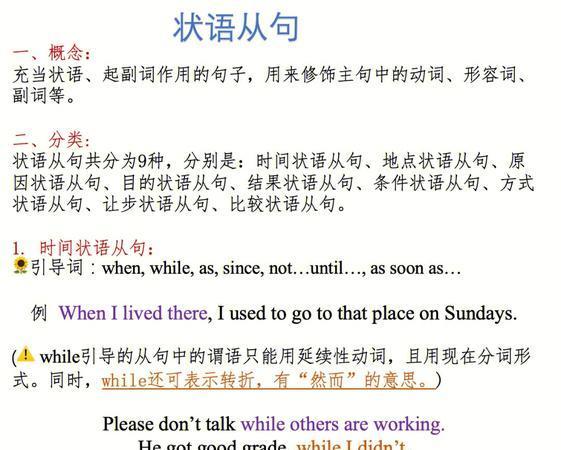状语从句是英语语法中的重要结构,可以分为时间状语从句、地点状语从句、原因状语从句、条件状语从句和结果状语从句五大类。时间状语从句表示何时发生动作,地点状语从句表示动作发生的地点,原因状语从句表示动作的原因,条件状语从句表示动作的条件,结果状语从句表示动作的结果。

时间状语从句
时间状语从句是用来表示何时或多久发生某个动作或状态的从句,通常使用时间连词如when, while, as, before, after等引导。例如:
- I will call you when I arrive in New York.(当我到达纽约时,我会给你打电话。)
- He fell asleep while he was watching TV.(他看电视时睡着了。)
- As I was walking down the street, I saw an old friend.(当我走在街上时,我看到了一位老朋友。)
地点状语从句
地点状语从句是用来表示发生某个动作或状态的地点或位置的从句,通常使用地点连词如where, wherever等引导。例如:
- I will meet you where we agreed.(我会在我们约定的地方见你。)
- He can work wherever he wants.(他可以在任何地方工作。)
- Where there is a will, there is a way.(有志者事竟成。)
原因状语从句
原因状语从句是用来表示某个动作或状态的原因或缘由的从句,通常使用原因连词如because, since, as等引导。例如:
- He didn't come to the party because he was sick.(他没有来参加聚会是因为他病了。)
- Since it's raining, we will stay inside.(因为下雨了,我们要呆在室内。)
- As he was tired, he went to bed early.(因为他累了,所以早早上床睡觉了。)
条件状语从句
条件状语从句是用来表示某个动作或状态的条件的从句,通常使用条件连词如if, unless, provided等引导。例如:
- If it rains, we will stay at home.(如果下雨了,我们会呆在家里。)
- Unless you study hard, you will fail the exam.(除非你努力学习,否则你会考试不及格。)
- Provided you finish your work, you can go out and play.(只要你完成了你的工作,你就可以出去玩。)
结果状语从句
结果状语从句是用来表示某个动作或状态的结果的从句,通常使用结果连词如so, such, that等引导。例如:
- He was so tired that he fell asleep immediately.(他太累了,以至于立刻就睡着了。)
- Such was his talent that he was offered a scholarship.(他的才华如此出众,以至于获得了奖学金。)
- The weather was so bad that we had to cancel the picnic.(天气太糟糕了,我们只好取消野餐。)

